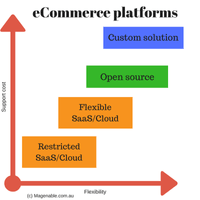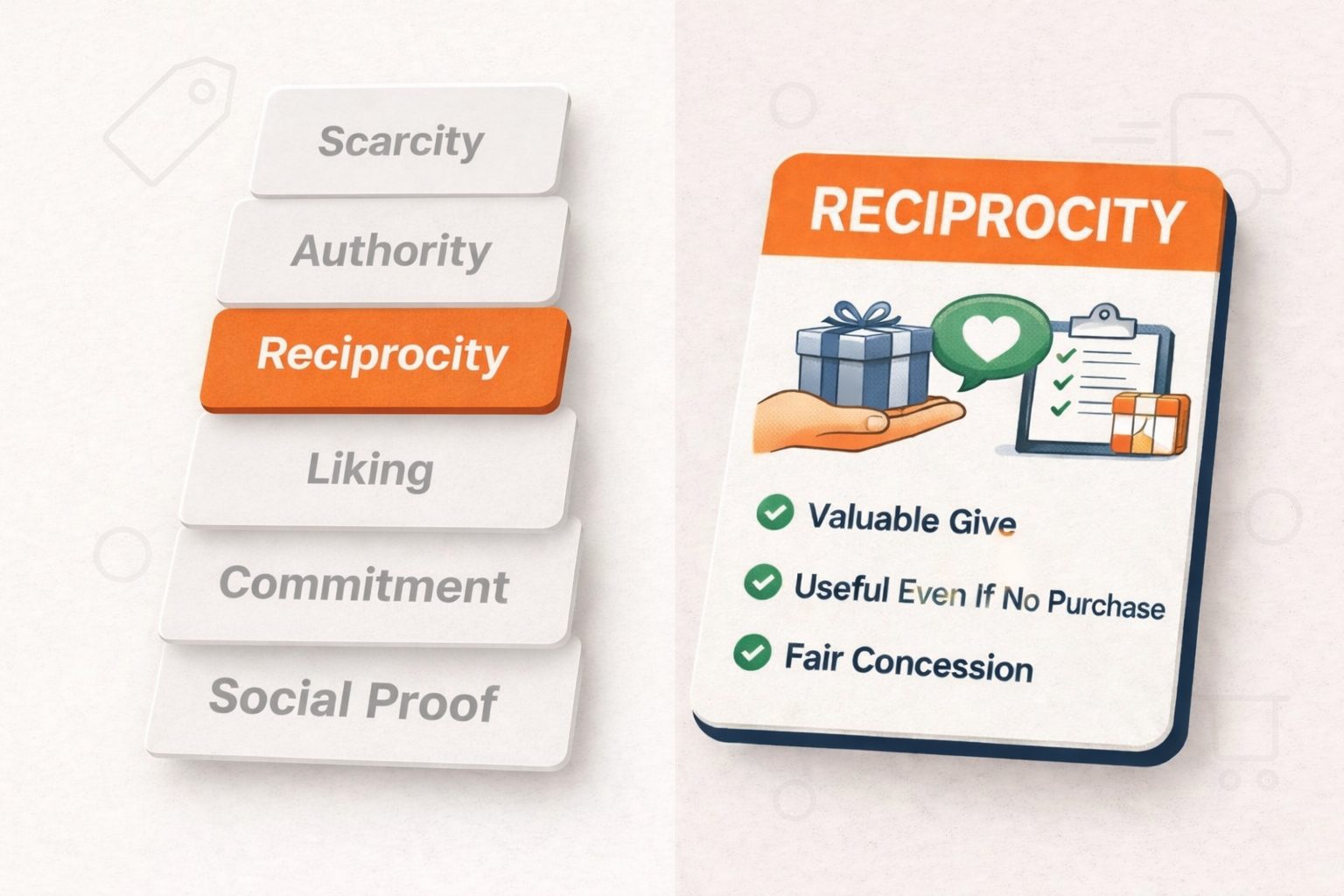If you are selecting an ecommerce platform for your online store, one of the choices is between open-source and cloud solutions. Most of the popular digital commerce platforms for small and medium business fall in one of these brackets. In this post you’ll find the good, the bad and the ugly of both choices.
Who is who. Cloud and Open-Source platforms
The graphic below shows you where some popular eCommerce platforms for small and medium businesses belong, are they cloud or open-source
As you may see there are plenty of choices. So what is the difference and what are the benefits and shortcomings of both types of eCommerce platforms?
Cloud /SaaS eCommerce platforms
Cloud, also often and probably more correctly called SaaS (Software as a Service) platforms is a class of solutions where a merchant rents a software together with infrastructure from the same vendor. That is why is called Software as a Service. You don’t need to purchase a separate hosting, update software and hardware there, this is all responsibility of a cloud solution vendor. Typically such vendors keep or rent big cluster of servers where host all their clients in the share infrastructure (this approach called multi-tenancy). So your online store uses exactly the same software with thousands of other merchants.
The benefits
Thanks to multi-tenancy cloud/SaaS solutions enjoy solid economy of scale and therefore can provide number of good benefits to their clients:
- Easier and cheaper support/maintenance. Platform support and maintenance (software updates, bugfixes, improvements) are provided over the whole shared infrastructure. Hence there is less need to do it on individual merchant level and such support typically is part of subscription fee that merchant pays. The level of support depends on the platform and the package you subscribe, as a rule more expensive plans provide more sophisticated support such as dedicated account managers and tailored consultations from vendor team
- Less need in technical resources. Good SaaS platforms are built to be mostly self-managed, so you need less help from IT experts to manage your website
- Faster and cheaper store creation. Typically time to set-up a store is also lower, the process is simpler and require less time, IT skills and money
- Scalability is not your problem. SaaS platform vendor will take care of your website load and increase the capacity to process more traffic and transactions if needed. Depends on the vendor you may need to upgrade your plan to process more orders or just pay more as increased revenue commission
Limitations
As almost always in our life the benefits comes with a price tag. Here are the limitations of cloud/SaaS ecommerce platforms
- Lower level of flexibility. You can’t modify and amend source code of your website hosted with SaaS vendor. So the customisation of SaaS based online store is limited by template/layout changes, some front-end code tweaks and enhancements available via APIs (custom built or through existing apps). If you have complex business requirements or want to provide your users with unique customer experience it may be hard or just impossible to do with SaaS solution. Talking about small businesses with limited resources, realistically you can only use out of the box features and existing apps plus modify website look and feel (in the frames allowed by the platform). Development of own apps that interact with a store through API in general is a complex and expensive exercise, out of the most small businesses budget.
- Higher level of lock-in. Since you buying hosting and platform as a package you can’t change a component of your solution (for example move your website to a data-centre in your country if such possibility isn’t provided by your vendor). In most cases you’ll be able to move out the data (customers, orders, products), but all your website functionality will be lost if you move out
- Success punishment. While SaaS platform usually have low entry point in terms of price, in most cases the more you transact through them the more you pay. Not all but many SaaS vendors charge you a percentage of your store revenue.
- SaaS specific business risks. SaaS vendors may increase the price (happens not that rarely), be acquired or shut the business down completely. Combined with high level of lock-in, the merchants are in not very good situation in this case and have hard time
Open-source eCommerce platforms
Open-source eCommerce platforms are shipped with full access to the source code and can be deployed to any compatible hosting, they are also often referred as self-hosted. There may be also closed sourced solutions where the source code is not available, but nowadays they are not very popular in SMB and mid-market business segments, so we’ll not discuss them in this post.
If you think that open-source is something exotic and rarely used you are totally wrong. In fact open-source software is a backbone of the Internet. Most popular web servers (Apache, Nginx), programming languages (PHP, Node.js, Python) and databases (MySQL, PostgresSQL) are open source. If it’s not enough, add Android and Linux operation systems, Mozilla and Chrome (based on open-source Chromium) browsers.
Open-source solutions may be supported by community or by a commercial entity. For example Magento is developed and supported by Magento Inc. Typically (while not always) open-source software is free to download and use commercially; the companies behind open-source software usually make money providing services or like Magento having a paid commercial version with extended functionality.
The benefits
- High level of flexibility. By the definition in open-source software you have full access to the source code, so can amend, change and modify it the way you need to achieve your business goals. It may be not always very easy (depends on the platform and the need), but possible. Flexibility of open-source systems surpass SaaS platforms
- Lesser lock-in. With open-source solution you can select where to host it and who will maintain your store. Popular open-source platforms have big community of developers (individuals and companies) that can help you in store creation and support and if they fail to deliver you may change your vendor without changing the whole platform. In the situation when a company that sponsors open source solution or community behind it stops to support it merchants have much more time to migrate out since there is no pressure that their websites just stop to work at certain time
- Greater level of control and ownership. The store is hosted on your infrastructure, so you have full access to the data and the code, can manipulate it the way you need, transfer and change it.
- Ecosystem. Popular open-source platforms have well developed ecosystem. I already mentioned developers above. Another component is plugins/apps/extensions. The most popular pure eCommerce platform Magento has around 10x more extensions than number of apps available in the most popular SaaS platform Shopify
Limitations
- While you may install standard WooCommerce or Magento website not being a skilled developer, in general open-source platforms need an expert IT person/team for both initial set-up and ongoing support/maintenance. The expertise comes with a price, so typically online stores based on open-source platforms are more expensive to build and support than SaaS solutions. If you start to save on support and maintenance your open source system may become out of date and insecure.
- You need plan for your growth. Since you manage your hosting you need to keep and eye on your business growth and upgrade your infrastructure if required.
So what, cloud or open-source?
There is no universal answer to this question. In general you make a trade-off between the flexibility of your platform and maintenance costs. The graphic below illustrates this choice in the 2 axis graph with custom solution being built from scratch as the most flexible and expensive option.

I can compare SaaS with renting an apartment and open-source with building your own house. If your business have simple current and mid-term requirements that can be met through SaaS solution, you have limited resources and accept SaaS specific risks you may be better of with SaaS/cloud solution.
If you prefer more control over the store, have complex requirements and budget to meet them and in general consider digital commerce as a way to differentiate and stay ahead of competition, a good open-source platform will better suit your needs.
Contact Us to get professional advice





